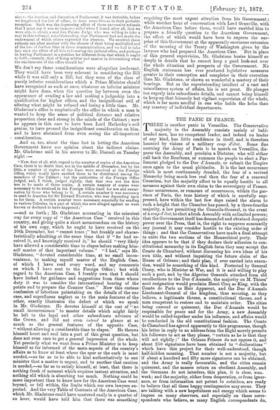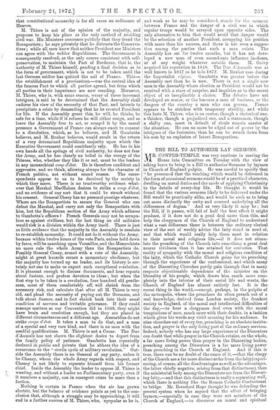THE PANIC IN FRANCE.
THERE is another panic in Versailles. The Conservative majority in the Assembly consists mainly of bald- headed men, has no competent leader, and indeed no leader of any kind, has little confidence in itself, and is therefore haunted by visions of a military coup d'Itat. Some fine morning the Army of Paris is to march on Versailles, dis- perse the Assembly, and proclaim a Dictator, who will either call back the Bourbons, or summon the people to elect a Par- liament pledged to the Due d'Aumale, or submit the Empire once again to the usual plebiscite. It is the last occurrence which is most continuously dreaded, the fear of a revived Monarchy being much less real than the fear of a renewed Ca3sarism, but the majority affect to be equally hostile to all menaces against their own claim to the sovereignty of France. Some occurrences, or rumours of occurrences, within the gar- rison of Paris, the true history of which is carefully sup- pressed, have within the last few days raised the alarm to such a height that the Chamber has passed, by a three-fourths majority, a law permitting the Councils-General, in the event of a coup d'etat, to elect afresh Assembly with unlimited powers; that the Government itself has demanded and obtained despotic power over the Press, that is, the right to suppress summarily any journal it may consider hostile to the existing order of things ; and that the Conservatives have made a final attempt to unite the two sections of the Monarchical party. Their idea appears to be that if they declare their adhesion to con- stitutional monarchy in its English form they may accept the Comte de Chambord, without discussing his own ideas of his own title, and without impairing the future claim of the House of Orleans ; and their plan, if ever carried into execu- tion, would be something of this kind. Protected by General Cissey, who is Minister at War, and it is said willing to play such a part, and by the Algerine Generals attached from old recollections to the Duo d'Aumale, the majority on M. Thiers' next resignation would proclaim Henri Cinq as King, with the Comte de Paris as Heir Apparent, and the Duo d'Aumale Lieutenant-General of the kingdom, thus securing, as they believe, a legitimate throne, a constitutional throne, and a man competent to restore and to maintain order. The cities being coerced or quiescent, the Duo d'Aumale would be responsible for peace and for the Army, a new Assembly would be called together under his influence, and affairs would be conducted in the old constitutional fashion. The Comte de Chambord has agreed apparently to this programme, though his letter in reply to an address from the Right merely permits his followers to act as they please, "certain as he is that they will act rightly ;" the Orleans Princes do not oppose it, and about 250 signatures have been obtained to " declarations " which have this project for their well-understood, though half-hidden meaning. That number is not a majority, but if about a hundred and fifty more signatures can be obtained, and the Army is really favourable, and the cities remain quiescent, and the masses return an obedient Assembly, and the Germans do not interfere, this plan, it is clear, wou. work; and the majority, either from desperation, or from ignor- ance, or from information not patent to outsiders, are ready to believe that all these happy contingencies may occur. They are talking with a new hopefulness and energy which seems to impose on many observers, and especially on those corre- spondents who believe, as many English correspondents do,
that constitutional monarchy is for all races an ordinance of Heaven.
M. Thiers is not of the opinion of the majority, and proposes to keep his place as the only method of avoiding civil war. His Ministers announce publicly that they dread the Bonapartists ; he says privately that he distrusts the Conserva- tives; while all men know that neither President nor Ministers can agree with the redder Republicans. The Government is consequently resolved, as the only course consistent with self- preservation, to maintain the Pact of Bordeaux, that is, the authority of M. Thiers himself, pending a final decision as to the form of government, which is not to be taken until the last German soldier has quitted the soil of France. This— the establishment of a provisoriurn—was the central idea of the famous Pact to which all parties agreed, but from which all parties in their impatience are now receding. Moreover, M. Thiers, who is, with some reason, weary of these incessant intrigues, is said to be determined that the Assembly shall endorse his view of the necessity of that Pact, and intends to precipitate a crisis by demanding that he be created President for life. If the Assembly grant this, he will, he thinks, be safe for a time, while if it refuses he will either resign, and so leave the Assembly free to act, or compel it by the moral pressure a Government of France can always exert to consent to a dissolution, which, as he believes, and M. Gambetta believes, and M. Rouher believes, would result in the return of a very determined Republican majority upon which the Executive Government could confidently rely. He has in his own hands all the springs of civil authority, he does not fear the Army, and he has clearly no belief in the energy of the Princes, who, whether they like it or not, must be the leaders in any monarchical cow) cre'tat. He is therefore confident and aggressive, and we think, allowing always for the character of French politics, not without sound reason. The corre- spondents appear to us to be deceived by the society in which they move. There is no trustworthy evidence what- ever that Marshal MacMahon desires to strike a coup d'etat, and no evidence of any sort that it could be struck without his consent. General Cissey has no personal prestige whatever. Where are the Bonapartists to secure the General who can defeat the Marshal, and carry not only the Bonapartists with him, but the Republican section of the Army which adheres to Gambetta's officers ? French Generals may not be scrupu- lous as against civilians, but the last thing an old militaire would risk is a division within the Army itself. There is just as little evidence that the majority in the Assembly is resolute to re-establish monarchy. It could not do it without the Army, because within twelve hours of the vote Paris, unless held down by force, will be marching upon Versailles, and the Monarchists. no more rule the whole Army than the Bonapartists do. Possibly General Cissey, armed with a vote of the Assembly, might at great hazards secure a momentary obedience, but the majority has turned up no leader, and its history is cer- tainly not one to make us expect such exceptional resolution. It is pleasant enough to discuss documents, and hear reports about fusions, and profess devotion to ideas ; but when the first step to be taken is a revolution, four hundred old gentle- men, most of them comfortably off, will shrink from the necessary risk, and calculate that after all M. Thiers is very old, and plead the necessity of paying out the Germans, and talk about finance, and in fact shrink back into their usual condition of nervous and irritable grievance. If they could manage matters as our Convention did in 1688, they might have brain and resolution enough, but they are placed in different circumstances and a different age. Assemblies do not strike coups cre'tat. It takes a man to do that, and a man of. a special and very rare kind, and there is no man with the needful qualifications. M. Thiers is not a Cwsar. The Duc d'Aumale has not shown the slightest desire to depart from the family policy of patience. Gambetta has repeatedly declared in public and private that he abhors the idea of a recurrence to the "sterile cycle of military revolution." Out- side the Assembly there is no General of any party, unless it ha Chanzy, whom the whole Army regards with respect, and Chanzy is not likely to separate himself from his former chief. Inside the Assembly the leader to oppose M. Thiers is wanting, and without a leader no Parliamentary party, even if it numbers a majority, can in emergent crises be more than a faction.
Nothing is certain in France when the air has grown electric, but the balance of evidence points as yet to the con- clusion that, although a struggle may be approaching, it will end in a further success of M. Thiers, who, npopudar as he is,
and weak as he may be considered, stands for the moment between France and the danger of a civil war in which regular troops would be arrayed upon opposite sides. The only alternative to him that would avoid that danger would be the selection of another President, occupying his position with more than his success, and there is not even a sugges- tion among the parties that such a man exists. The Assembly has sat for twelve months, but it has not deve- loped a new man of even second-rate influence in-doors, or of any weight whatever outside them. M. Gr6vy acquired his reputation in 1848. The Dac d'Aumale was as well known in 1847 as he is in 1872. M. Rouher rose during the Imperialist n'giine. Gambetta was greater before the Assembly met than he is now. There is not a single new man in the Assembly whose election as President would not be received with a stare of surprise, and inquiries as to the secret object of so inexplicable a choice. The debates have not developed an orator, or the bureaus a man of business, or the dangers of the country a man who can govern. France appears to be stricken with temporary sterility, and while this lasts M. Thiers, who is an orator, though a rhetorical one, a thinker, though a prejudiced one, and a statesman, though a shifty one, must in default of rivals remain master of the situation. He can no more be edged out of power by the intrigues of the fusionists, than he can be struck down from his seat by an explosion of latent Bonapartism.



































 Previous page
Previous page